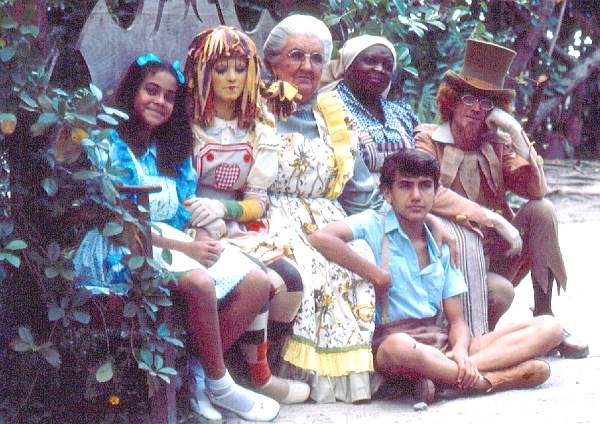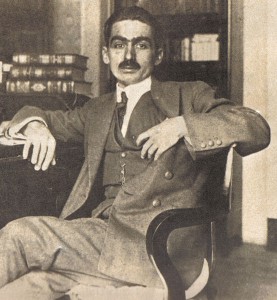Whilst reading this article, why not listen to the song Yellow Woodpecker's Ranch (Sítio do Pica-Pau Amarelo [1]) [pt], the soundtrack of the classic Brazilian television series based on Monteiro Lobato's children's books.
Song by Gilberto Gil, available from the artist's website. Click [2] to open the audio player in another window.
During recent months Brazilian citizen media has been debating literature, censorship, racism and education, following the suggestion by the country's National Council on Education (NCE) to withdraw celebrated author Monteiro Lobato's book Caçadas de Pedrinho (Pete's Hunting) [pt] from schools.
Lobato's Caçadas de Pedrinho was made into a famous television series [1] in the 1980s which is still broadcast in Portuguese language-speaking countries today. In the late 1990s it was adopted as teaching material in schools throughout Brazil, and it has also been part of a government program that distributes books to children in public schools.
However, at the end of 2010 a citizen filed a complaint claiming the book does not follow NCE's courseware directives [3] [pt], particularly regarding “the absence of prejudice, estereotypes or doctrination”, in a list of criteria that also includes “the quality of the text, the theme, the graphic quality and the reading potential, considering the target audience”. Sergio Leo explains [4]:
(…) os especialistas do MEC [Ministério da Educação] analisaram a denúncia e tiveram de admitir que a obra tem elementos racistas e concluíram que, do jeito que está, não deve constar da lista de distribuição, a menos que tenha uma orientação ao professor e aos pequenos leitores, mostrando que lá em 1933 havia mais racismo no Brasil e que não se deve tomar como padrão de conduta e valor o tipo de referência depreciativa que Lobato faz a negros.
Opposition to the suggested withdrawal has come from many sides. Intellectuals from the Brazilian Academy of Letters have protested [5] [pt] the move. Jarbas, from the blog Boteco Escola (Pub School) [pt] described [6] the case as “pedagogical censorship”.
The blog Música Pura (Pure Music) [pt] stated [7] that literature is a heritage that cannot be proofread according to conceptual innovations. Aldo Rebelo from the Communist Party posted [8] [pt] a harsh criticism comparing the veto applied to Caçadas de Pedrinho to the installation of “a literary court in Brazil”.
Valdeci, from the blog Mais de 140 caracteres [9] (More than 140 characters) [pt], made an appeal not only in support of Lobato but also to all writers who dared to challenge political correctness:
Agora o Conselho Nacional de Educação vai tomar para si o direito de invadir editoras mundo a fora, com se donos da verdade absoluta fossem, para recolher os livros de Monteiro Lobato, Machado de Assis, Castro Alves e tantos outros escritores que “ousaram” escrever suas histórias longe da hipocrisia do politicamente correto (termo e conceito estes que nem existiam na época)…
Monteiro Lobato [11] is the mastermind responsible for books that have entertained generations of Brazil's children. Viewed as a national hero, he has made a significant contribution to the country's cultural heritage.
Brazilian author Maurício de Souza, the creator of children's comic book Turma da Mônica [12] (Monica's Gang) [pt], was quoted by Silvana Nunes in Meu caderno de poesias [13] (My poetry notebook) [pt], making a heartfelt defense of Lobato's work:
(…) durante essa guerra que travava contra o atraso, semeava ideias e livros para as crianças. Os melhores de todos os tempos.
However, César Baldi cited by BloQ [14] [pt], sees limiting the idea of racism to the moment the book was written (an argument used in Lobato's defense) as denying the permanent nature of the discrimination of black people.
 [15]
[15]The cast of Yellow Woodpecker Ranch in the Globo television series based on Monteiro Lobato's children's books. Image courtesy of Obvious magazine.
Terezinha Pereira from the blog Alma Carioca (Carioca Soul) [pt], questioned [16] the criteria adopted by the NCE and the Special Secretariat in the analysis of the complaint:
Nem devem imaginar que personagens da ficção “tem voz própria” que, necessariamente, não é a mesma do autor. E se fosse? Não seria um bom motivo para discussão na escola?
Idelber Avelar, from the blog O biscoito fino e a massa (The cracker and the mass) [pt], gave an educational perspective [17] to the matter:
a contextualização [é] necessária para que epítetos, comportamentos discriminatórios, racismo explicito, ódio a povos ou a orientações sexuais etc., sancionadas e apresentadas como normais no contexto em que a obra foi escrita ou no interior dela (…) sejam lidos criticamente e não replicados como modelo pelos alunos. Não é tão fácil como parece. No caso de Monteiro Lobato, é imensamente difícil.
To Sergio Leo [4] [pt] the greater share of critics of the NCE's report never read Lobato's novels, getting to know his work only through television adaptations which were freed from “racism and other stuff”.
Alberto Mussa, cited by Rafael Rodrigues in Entretantos [18] (Meanwhiles) [pt], believes it is time to get over the idea that in Brazil neither racism nor prejudice exist. In his original post [19] in a literature journal, Mussa asked to be convinced:
Me convençam que uma criança negra lendo uma passagem racista de um dos livros do genial Lobato não vá se sentir vexada, discriminada, constrangida. Me convençam que livros como esses não violam a integridade psíquica e moral da criança – que somos, por lei, obrigados a proteger.
The debate over the Monteiro Lobato case showed clear differences between mainstream media coverage of the issue and that of the blogosphere. The former was comfortable with the censorship approach, setting an agenda that fueled in some cases the wrong discussions.
The blogosphere meanwhile went deeper into the subject and presented a variety of points of view, for and against, ones that were not available to the average media reader or viewer.
